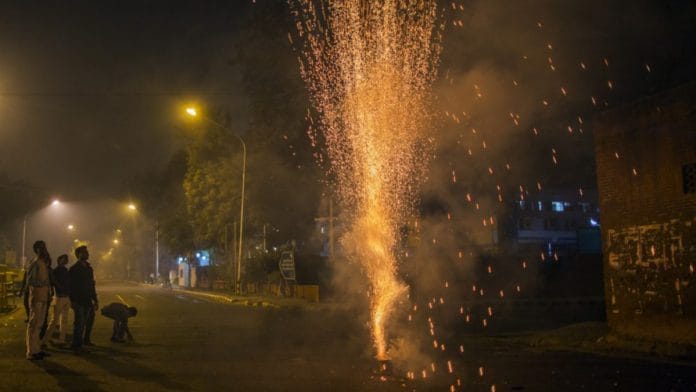New Delhi: Ever wondered what happens to those arrested for violating the cracker ban in the National Capital Region (NCR)? According to police officers and lawyers, most are let off at the police station itself, and those hauled to a trial get away lightly, with no jail time.
Take Gautam Buddh Nagar (Noida) district for instance. This year, 141 people were arrested against 114 FIRs registered for flouting the blanket ban on the sale and bursting of firecrackers, also endorsed by the Supreme Court.
Gautam Buddh Nagar Additional DCP Ranvijay Singh told ThePrint that most were released within a few hours of their arrest.
“Some of them were the sellers of the crackers and some were bursting them. So we lodged cases against all such people. But since all the actions are bailable in nature, they were given bail in the police station after serving the notice under 41 CrPC (criminal procedure court),” the police officer said.
“As per the Honourable Supreme Court’s guidelines, we can not send anyone to jail for an act where the punishment is less than seven years. So as per that direction, we released them from the thana itself.”
It’s a similar story in Delhi.
While the Delhi Police does not disclose data on how many offenders are released of those arrested in the national capital, a police officer, on the condition of anonymity, told ThePrint that these are very minor offences, and hence, none of those arrested are even brought to jail.
“They are released on the spot after they pay some amount of fine. The bail happens right there,” the officer said. “The seizure of firecrackers is more important in such cases”.
According to Delhi Police data, 281 people — 138 for selling and supplying firecrackers and 143 for bursting them — were arrested between 28 September and Diwali on 4 November.
The number is a drastic drop from last year when 850 people alone were arrested on the day of Diwali, 14 November 2020.
This year, in September, the Delhi government had imposed a ban on the sale and bursting of firecrackers up to 1 January 2022, with the punishment being a fine of Rs 10,000 in residential and Rs 20,000 in silent zones.
Also read: Delhi AQI post Diwali worst in 5 years, but crackers, stubble burning may not be only problems
‘Minor offence, bail happens quickly’
Criminal lawyer Mehmood Pracha said such cases have summary trials because it is considered a minor offence (summary trials are those in which the cases are disposed of speedily as the procedure is simplified).
“Most of the people get bail, and if they are acquitted, they are mostly fined. The trials are very short, if at all they happen, and most people can get free in the beginning due to plea bargain as per Section 265-A,” he said.
“The magistrate can finish the case at any time; such trials finish within months. There is no maximum punishment for such offences… There should be a financial punishment on a stronger note.”
Those violating the ban are arrested under IPC Section 188 (disobedience to order duly promulgated by Public Servant), Section 269 (negligent act likely to spread infection of disease dangerous to life ) and Section 270 (malignant act likely to spread infection of disease dangerous to life).
The National Crime Records Bureau (NCRB) also does not specifically feature such offences on its records. They are listed under environment-related offences and seizures under the Arms Act.
The NCRB data for 2020 has listed 7,318 cases under the ‘noise pollution’ category, but it does not mention how many of them were due to firecrackers.
(Edited by Arun Prashanth)
Also read: 80% Delhi-NCR families have at least 1 member ailing due to air pollution, new survey says






